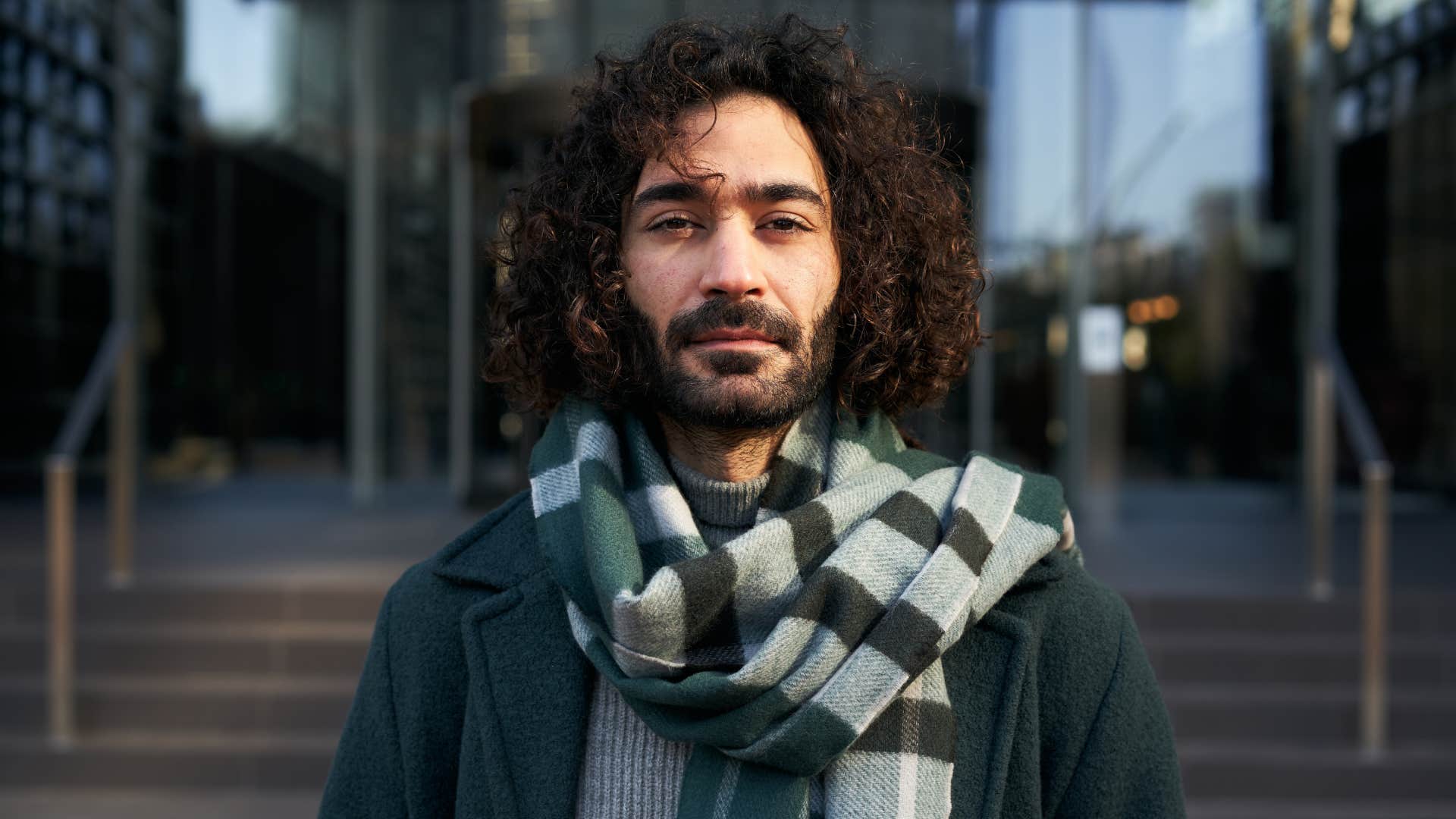11 Things That Never Trigger People Who Are Truly Confident
When you're confident and secure in yourself, certain things simply roll off your back.
 Jacob Lund / Shutterstock
Jacob Lund / Shutterstock When people talk about having confidence, it can seem like an unattainable trait and something you either have or don't. But in reality, confidence isn't about being arrogant or having all of the answers all of the time — it's about being secure in who you are and embracing your strengths and weaknesses without listening to outside voices and opinions. For that reason, there are certain things that simply never trigger people who are truly confident.
Once you're able to truly live your life in confidence and accept your worth, you find yourself unbothered by behaviors and circumstances that might be a huge problem for someone who still has work to do when it comes to trusting themselves and building their self-esteem.
Here are 11 things that never trigger people who are truly confident
1. People not liking you
 CarlosBarquero | Shutterstock
CarlosBarquero | Shutterstock
Once you're secure in who you are, pandering to others and trying to please everyone around you is suddenly not a concern. If someone doesn't like you, it's no longer a bother or trigger. It's definitely a much better reality if we believe that everyone we meet will like us, but that's just not the case.
Sometimes, we're not everyone's cup of tea and there's nothing wrong with that. True confidence comes from accepting that you won't be for everyone. In fact, Kendra Cherry, a psychosocial rehabilitation specialist, psychology educator, and author, wrote for Verywell Mind that being a people pleaser isn't "necessarily a bad thing."
"Being a concerned and caring person is an important part of maintaining healthy relationships with loved ones. It becomes a problem, however, if you are trying to win approval to shore up weak self-esteem or if you are pursuing the happiness of others at the expense of your own emotional well-being."
2. Rejection
 fizkes | Shutterstock
fizkes | Shutterstock
Rejection is simply redirection rather than a reflection of your worth. That said, it can definitely be hard to see it that way, no matter which way rejection is happening in your life. Whether it's a professional rejection, personal rejection, or romantic rejection — it can all hurt the same.
Mark Leary, a former psychology professor at Duke University, told CNBC Make It that rejection is actually good for your brain. "The reason it continues to hurt is the same reason why we continue to experience pain when we step on a sharp object," he said.
"Negative emotions are a warning that something there might be damaging to your wellbeing. The fact that you feel bad about rejection means you are a normal human being."
3. The silent treatment
 PeopleImages.com - Yuri A | Shutterstock
PeopleImages.com - Yuri A | Shutterstock
Once you're truly confident and secure in yourself, you no longer desire to chase people who choose to withdraw and isolate themselves instead of communicating their feelings, especially in moments of conflict. Giving someone the silent treatment is an immature and juvenile way of dealing with your problems, especially when the other person is giving you multiple chances to express what's on your mind and get it off your chest.
Bernard Golden, a psychologist, wrote for Psychology Today that the silent treatment is a challenge for anyone but "it is especially difficult for individuals who already have low self-esteem as well as individuals who have anxious attachment."
There's definitely a difference between healthy disengagement and just blatantly giving someone the silent treatment. But being able to accept someone giving it to you without allowing it to disturb your peace is truly a testament to your own confidence.
4. Other people's success
 santypan | Shutterstock
santypan | Shutterstock
For someone who struggles with confidence and self-esteem, seeing other people around them succeed and hit their milestones can easily trigger them, whereas confident people are able to understand that someone else winning doesn't necessarily mean they're losing. They understand that there's enough success, achievements, and opportunities to go around for everyone.
In an article for Harvard Business Review, Shasta Nelson, a friendship expert and leading voice on loneliness and creating healthy relationships, explained that it's important to self-reflect about why you may feel disappointed in success happening to those around you.
"Write down your answers about what rejection means to you on a piece of paper and be as specific and honest as possible. Now spend some time with your words and notice any patterns. Do any emotions show up more than once? What does that tell you?" Nelson encouraged.
"While this self-reflection will not be an easy task, working through your feelings and understanding what really matters to you will inform what you do next."
5. Being challenged
 Sabrina Bracher | Shutterstock
Sabrina Bracher | Shutterstock
Confident people rarely feel triggered by being presented with a challenge. They're able to recognize their self-worth and abilities so that when someone does challenge them, they don't take it as a personal attack but as an opportunity to engage in meaningful conversation and growth. They enjoy the process of being able to tackle a challenge and come out on the other side stronger and wiser.
Confident people may even actively seek out challenges because they know by completing them and giving them their all, they are expanding their capabilities and sharpening their skills.
6. Someone else's opinion of them
 CarlosBarquero | Shutterstock
CarlosBarquero | Shutterstock
Truly confident people rarely feel insecure or bothered by hearing what other people think of them because of how secure they are in both their strengths and weaknesses. Hearing what other people think of them simply rolls off their backs, and they refuse to internalize perceptions of them because they truly don't see it as a reflection of their personality and self-worth.
In an article for Psych Central, Kate Bettino, a mental health expert, noted that in order to get over caring too much about other's opinions, you must expect and accept that people will have opinions about you. By developing a sense of self-confidence, the criticisms are less likely to sting.
"Confidence building and developing a sense of self go hand-in-hand," she said. "Being confident in who you are and what you stand for will boost your self-esteem and willingness to ignore haters."
7. Criticism
 Perfect Wave | Shutterstock
Perfect Wave | Shutterstock
Confident people can discern between personal attacks against them and constructive feedback that is being offered to aid in their growth. Instead of being defensive or letting it shake their self-confidence, these individuals can assess any criticism that comes their way with an open mind.
Christine Hourd, ACC, a Certified Professional Success and Leadership Coach, explained that "feedback is like gold, and if you see it as valuable instead of judgmental, then you can use it to your benefit."
"Receiving feedback is a gift from someone else who cares enough to tell you that something is wrong. It lets you know what you’re doing right and where you can improve," she added.
8. Difficult conversations
 GaudiLab | Shutterstock
GaudiLab | Shutterstock
Confident individuals no longer have a deep, innate fear of having difficult conversations with others. Instead of shying away from confrontations and feeling so triggered that they are unable to voice their thoughts and feelings, these people can approach the situation with composure.
They recognize that the ability to have difficult conversations is a sign of emotional intelligence, and they don't see disagreements as threats or something personal but rather as an opportunity to mend any tensions and create healthier relationships with the people in their lives. Being able to have difficult conversations is a critical life skill, and it truly starts with understanding and managing your emotions.
9. Being misunderstood
 Romanchini | Shutterstock
Romanchini | Shutterstock
When someone is truly confident and secure in themselves, they no longer feel the need to over-explain themselves to other people just to feel accepted. They know that no matter how succinctly they explain themselves and their feelings, there will always be at least one person who will misinterpret their words or actions.
If a person isn't confident, they can view being misunderstood as a reflection of who they are, when in reality, that's not the case. While it can be extremely frustrating to be misunderstood, a truly confident person would never let it define them or trigger them.
10. Change
 Miljan Zivkovic | Shutterstock
Miljan Zivkovic | Shutterstock
Change can be a scary and unpredictable time for anyone, but confident individuals view change as inevitable and an opportunity to self-reflect and adapt to what is happening around them and in their own lives. Rather than becoming triggered and trying to resist change, they understand the beautiful things that can come from being open and adapting to change.
Confident individuals don't find enjoyment in remaining stagnant, and they have the utmost trust in their abilities to navigate uncertain times and experiences.
11. Being alone
 Dusan Petkovic | Shutterstock
Dusan Petkovic | Shutterstock
Finding peace and serenity in being alone is something that not everyone can do without internalizing their feelings. Confident individuals are able to enjoy solitude and sit with their thoughts and feelings without being uncomfortable or restless.
There's great power in being able to enjoy your own company without having to use other people and social interactions to run away from problems that you need to confront by being alone.
Even when they are isolated, confident people don't feel disconnected from the world and from people in their lives because of how secure they are in themselves. They use their alone time as a tool to feel even more fulfilled.
Nia Tipton is a staff writer with a bachelor's degree in creative writing and journalism who covers news and lifestyle topics that focus on psychology, relationships, and the human experience.

